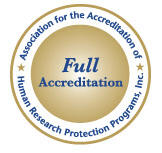If you must be in contact with study subjects because of therapeutic benefit or stopping would cause harm (regardless of where the study is taking place), or if you have approval from your School/Dept to conduct in-person human subjects research:
Please check with your School or Department to inquire as to whether it is permissible to conduct in-person research. Approval must be received from your School/Department. Not sure how to obtain this approval? Please see Instructions for Returning to In-Person Human Subjects Research.
- Remind study staff and study subjects of simple measures to lower risk and prevent spread of viruses (not shaking hands, practicing social distancing, etc). Ensure easy access to handwashing facilities, and make sure alcohol-based sanitizers are readily available.
- As much as possible, limit the size of groups.
- Follow any guidelines or instructions from the specific facility where study subject interaction would occur. As some research may occur in another state, with another institution, or under the direction of another IRB (as in a reliance agreement situation), this is especially important. Please also pay attention to the Harvard School that you are associated with as additional restrictions may be in place.
- Consider the participant population (e.g., are they considered “high risk” for COVID-19?) and the setting in which the interaction would occur.
- Know and understand restrictions and other considerations based on the COVID-19 status of the areas that study subjects may be traveling from.
- Develop possible alternatives to in-person study visits such as using remote technology to instead of meeting in person.
- Implement a Screening Procedure. (See below)
General Guidance: COVID-19 Screening
A screening process for symptoms, recent travel, or exposure to confirmed cases of COVID-19 is not considered a research procedure and does not require review or approval by the IRB. The following approach is advised:
- Please contact participants prior to their appointment and inform them that they should not come in for the study visit if they have a fever, sore throat, and/or symptoms of acute respiratory distress (cough, difficulty breathing, etc.). Inform them that they will be immediately sent home if they arrive for their appointment and exhibit any of these symptoms and their appointment will be rescheduled.
- Ask participants about recent travel, especially travel to areas (national or international) with high rates of COVID-19 infection. If they have, inform them that their appointment will be rescheduled.
- Ask participants if they have been in close proximity to a person with a confirmed case of COVID-19, or a person who is currently a person under investigation for COVID-19 infection (i.e., the person has been or will be tested for COVID-19). If they have, inform them that their appointment will be rescheduled.
- Reassure participants that study visit compensation (if applicable) will still be received if their visit needs to be rescheduled.
- Screen procedures should also be conducted for participant appointments where study procedures are conducted at the participant’s residences or at a non-Harvard location.
- In the event that a participant clears the screening, but exhibits symptoms at the time of appointment, the study procedures should not be conducted, and the participant should be instructed to return home and to contact (by telephone) their healthcare provider to arrange for an evaluation and their care. The participant should also be informed that the study personnel will contact them to reschedule the appointment. If the appointment is at the participant's residence or at a non-Harvard location, please follow the same guidance, and study personnel should immediately leave the premises, report the incident to the Lead Researcher, and follow all Harvard procedures and guidance regarding social distancing and self-quarantine as applicable.
You may also wish to refer to Crimson Clear which is a Harvard University program for Harvard faculty, staff, students, and invited visitors to campus. The purposes of the program are (1) to enable members of the Harvard community and prospective visitors to self-report to the University daily on whether they are experiencing symptoms of COVID-19 infection, and (2) based on that self-reporting, to generate clearances to access University buildings and facilities. Please see more information about Crimson Clear on the Office and Lab Requirements web site. See Step 4: Complete an attestation through Crimson Clear.

